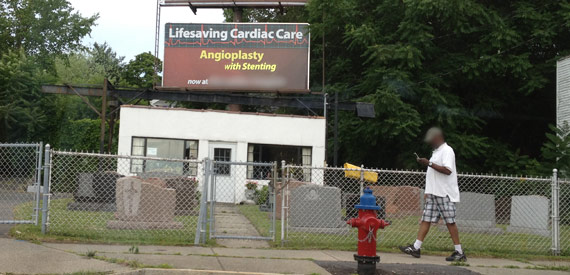DOA: Hospital Marketing Emergencies
How medical jargon and poor execution can damage reputations
For the record; I am sure the hospital advertised in the billboard below is a fine organization, staffed by trained and board-certified doctors and nurses prepared to help me in a cardiac emergency.
Yet, when I read this ad for “lifesaving cardiac care” I was afraid. My blood pressure dropped and I thought, why don’t they just advertise a scalpel and a defibrillator while they’re at it?

This advertisement terrified me for two primary reasons:
- Scary medical jargon: What is angioplasty with stenting and why is it desirable? Even if I were a heart patient, this over-technical terminology would baffle me. A neurobehavioral study done in 2008 compared the impact of medical terms and lay terms used in marketing and communications… What they learned is that the more medical terms you use, the more frightened and worried people become about their conditions. Ask yourself this; do we want to scare people or do we want to get them to make an appointment?
- Frightful media placement: Why would anyone place a healthcare advert over a tombstone yard sale? Intentional or not, the juxtaposition of heart surgery and headstones distracts people from the exceptional care the organization provides. Rather than making a positive impression, many people may lose trust and confidence in the hospital.
And then there’s the issue of advertising a very specific, non-elective procedure. Even today’s health-savvy consumer wouldn’t look up to their doctor from the hospital bed and say, “I’ll have the angioplasty… with stenting.” I am sure the patient would not walk out in disgust if the hospital didn’t offer this procedure. The doctor could refer the patient to another hospital if it was medically necessary. What good then would it do to advertise this procedure?
All this leads me to believe the agency or marketing team responsible for this ad didn’t do their due diligence in executing this campaign. I wonder if they asked key questions about the target demographic, their ability to understand terminology and what would compel them to make an appointment? At the very least these questions could have directed the strategy and helped avoid many of the poor decisions that were made in this example.
Do you have any healthcare marketing emergencies to share?
